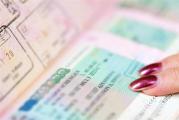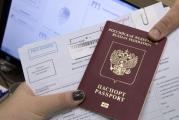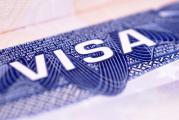Moroccan work visa
The Kingdom of Morocco attracts Russians not only with its local color and climate, conducive to a pleasant and fairly inexpensive holiday, but also with the absence of the need to apply for a visa to this country. Since 2005, citizens of the Russian Federation have not been interested in how much a visa to Morocco costs, so in 2017 it is also not needed.
What is required to enter Morocco?
In order to freely enter the territory of this state, you only need a passport and a migration card. After entering the country, you have the right to stay in it continuously for no more than 90 days. There is only one requirement for a foreign passport: the document must remain valid for six months from the date of departure from the kingdom.
As soon as you arrive at the Moroccan airport, at the border control point, you will be stamped in your passport on arrival (and then on departure), as well as a personal number, which will also be registered in your passport. There are no consular fees or state duties to pay. It is also advisable to have a return ticket with you, as the border guards may be interested in having it. In some cases, confirmation of your financial solvency is required.
Important: if you intend to stay in Morocco for more than three months, you will need a special temporary residence permit for foreign citizens. You can get it at the nearest police station, and you need to do this at least 15 days before the end of your stay in the country.
Advice : if you have an international health insurance policy, take it with you just in case, as medical services are very expensive in Morocco. The exception is urgent medical care, which is provided free of charge.
About the migration card
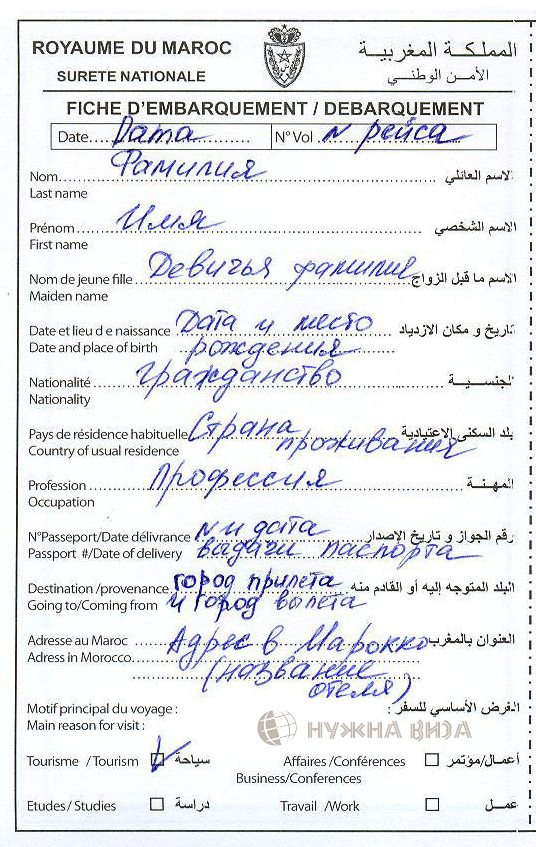 The migration card can be filled out just before crossing the border, as soon as you arrive in Morocco. However, in most cases it is filled out on the plane (it is also issued there). This allows you to speed up the process of passing border control. You can ask the flight attendants for help in filling out, or you can print out an already completed sample (in the figure on the right) and take it with you as an example.
The migration card can be filled out just before crossing the border, as soon as you arrive in Morocco. However, in most cases it is filled out on the plane (it is also issued there). This allows you to speed up the process of passing border control. You can ask the flight attendants for help in filling out, or you can print out an already completed sample (in the figure on the right) and take it with you as an example.
The data should be entered into the card with a black or blue pen, in Latin block letters. If you are traveling with the whole family, then you need to fill out cards for each of its members, including children who have their own passports. At home, you should not print out an empty migration card form and fill it out.
A few tricks
You can stay in Morocco for a maximum of 90 days. After this time, you need to leave the country, and then, if you wish, enter again. If you have such a desire, then in order not to waste time and a lot of money, you can use a few tricks.
- If you have a Schengen visa, then it will be cheaper for you to leave Morocco for Spain or the Canary Islands, and from there return to the kingdom again for the next 90 days.
- If there is no visa, then you can leave for Tunisia or Mauritania. True, a visa to Mauritania is still needed, but this issue can be resolved face to face with the border guards. For 20-30 euros, you may well be given entry and exit stamps from Mauritania, without any visas.
About customs
If everything is clear with a visa to Morocco and documents, then the issue of customs clearance is still open. What can and what cannot be brought into the kingdom and taken out of it? So, foreign currency (dollars, euros, etc.) can be imported and exported in any quantity, but you will have to change it to local money - dirhams. The circulation of foreign currency around the country is prohibited, as well as the export of the national currency of the kingdom.
With regard to alcoholic beverages and tobacco products, the following are not subject to duty:
- One bottle of very strong drink and one bottle of wine per adult;
- Up to 200 tons of cigarettes (10 packs), or 250 g of tobacco, or 50 cigars.
It is mandatory to declare professional photographic equipment, as well as equipment for hunting and sports. All ammunition must be packed in cases and cases and sealed. In some cases, the import of the above equipment requires an official permit. It is also prohibited to import:
- Video, photo and printed products containing pornographic elements;
- Materials that are contrary to Islamic norms;
- Weapons, including pneumatics, gas, traumatic, as well as ammunition;
- Drugs.
The import of things and objects that are of artistic or historical value is allowed only upon presentation of a special permit. Vehicles are allowed to be imported without registration for up to three months (90 days). Gasoline cans are not allowed. Only the amount of fuel that is directly in the tank of the car at the time of its importation is allowed. If you are going to drive a car imported into Morocco, take care of an insurance policy and an international driver's license.
How to travel to Morocco with children?
To take a minor child with you on a trip, no additional documents are required. This applies if the child is traveling with both parents. If the child is traveling with only one parent, then a notarized permission from the second spouse to take the child abroad is additionally required. It does not matter if the parent of the child is married.
If the second parent is not alive, or he is deprived of parental rights, it is necessary to provide the relevant documents (death certificate or court decision). If the child is traveling with third parties, permission to take him/her out from both parents is required.
Morocco work visa
If you do not need a visa to travel to Morocco, then you need to apply for one to work in this country. To get a job, you first need to find the job itself and make sure that the employer is really ready to provide it to you. In fact, getting a job in Morocco is not easy, because in this country preference is given to local personnel. But you can still try here: anapec.org. You will be in demand if you are fluent in French. Ideally, of course, you also need Arabic and English.
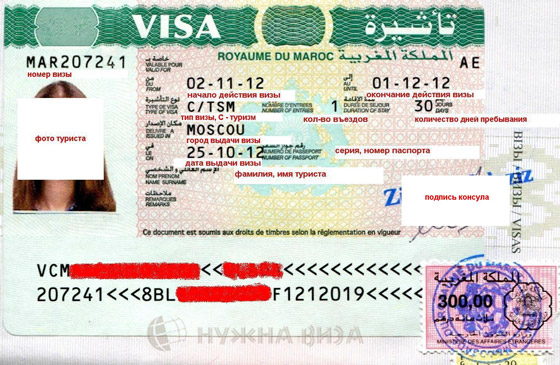
Specialties for which Russians are taken very willingly are call center operators and teachers of French or English. However, many manage to find work as guides or managers in local travel agencies, as well as surf and kite surf instructors.
As soon as you find a job, the employing company must send you a document (work permit) confirming the intention to accept you for a particular position. Also, the document should indicate that this vacancy is not occupied by anyone, and that you are the only applicant for it.
You come to the embassy with the following documents:
- Application form (the form must be taken at the embassy and filled out);
- 4 photographs 35x45 mm, taken no more than six months ago;
- A valid passport with at least one blank page;
- Work permit from a company registered in Morocco;
- Document confirming payment for a work visa.
The cost of a visa to Morocco (working) can be found out only during a personal visit to the consulate or embassy. Unfortunately, even over the phone this information is not always provided.
How to get to Morocco?
Until quite recently, it was impossible to get directly into Morocco. All flights were with transit transfers. Today, from Moscow, you can take a direct flight from Sheremetyevo Airport to Casablanca. The plane flies there three times a week. The duration of the flight is about 6 hours. Ticket price - from 300 euros. Direct flights to Morocco are operated by Royal Air Maroc. But if you wish, you can choose a cheaper flight option. To do this, today there are many specialized Internet resources for finding cheap air tickets.
About money
To avoid problems with the exchange, It is better to take dollars or euros with you in Morocco. You can exchange them for Moroccan dirhams either at a bank, or at a hotel, or at an ATM, or at exchange offices marked with a “golden” inscription. The exchange rate is the same everywhere, which eliminates the need to look for a more profitable option. The exception is the "black market", so it should be avoided. In addition to the fact that such an exchange is not profitable, you may additionally have problems with the local police.
Advice: when you change currency in the places established for this, be sure to take a certificate.
In all decent hotels, shops and restaurants you can pay by credit card (Master Card, Eurocard, American Express and Visa). But you still need to have some cash with you. If you get to the market and decide to buy something, bargain mercilessly. Moroccans love it and even look forward to it. They are very sociable, and it is important for them not only to sell a thing, but to talk and bargain. In the course of such heated debates, you can buy the thing you like for several times cheaper than the declared price.
About tips
Tipping is very popular in Morocco and is therefore always welcome. In restaurants and hotels, tips are usually already included in the bill (10% of the total order), but if you give "baksheesh" on top, Allah will count it. As for the attendants, the following amounts will be enough for them:
- Maids - from 2 to 10 dirhams per week;
- Car guards - 1-2 dirhams;
- Car washers - 5 dirhams;
- Drivers or guides - 10 dirhams per tour.
Of course, these are just averages. In fact, you can leave as many tips as you like.
Is it expensive to live in Morocco?
Everyone decides this question for himself, because it all depends on where exactly he will live. If you can afford luxury hotels, then life in the kingdom of Morocco will cost you many times more. If you are unpretentious, then you may well settle in a riad - a typical Moroccan hotel. It is a rectangular or square building, decorated in a traditional design for this country, with a spacious courtyard.
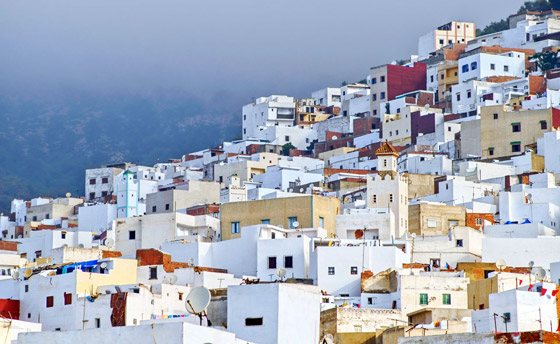
Some riads have a rooftop pool or cafe. To rent a room or apartment in such a hotel, you will need to pay about 25 euros per day. If you are planning a long-term stay in the kingdom, then it will be cheaper to rent an apartment. So, in the north of the country, the cost of rent per month is from 350 euros, and in the south - from 150 euros. And this despite the fact that these amounts already include the cost of water and electricity.
If you are going to not only live, but also work in Morocco, your monthly salary should be enough for you to do everything. On average, people here earn from 600 euros per month. Meals will "pull", on average, 200 euros per month. So if you approach the issue of life in the kingdom rationally, over time you can more than decently provide for yourself and even buy a house within 30 thousand euros (this is with a good repair, furniture and all amenities).
What to drive around the area?
In Morocco, you can easily rent a car. True, only those who are already 21 years old and who have an international driver's license can do this. A middle-class car can be rented for about 450 dirhams (about 40 euros) per day.
Advice: when renting a car, first check its technical condition, and only then sign the contract. The fact is that cars often come with hidden defects that no one will warn you about. And when you return the car, you will have to pay for these defects (with money, of course).
If you have an extra thousand euros, and you have a love for animals, then to travel around the area you can buy yourself ... a camel. You will have your own desert ship, where you can freely cut through the yellow sands of the Sahara or just go shopping. They will not look at you with surprised eyes, because in Morocco, using these beasts of burden as transport is in the order of things.
In the absence of money to buy a camel and rent a car, you can use public transport. So, travel in an intercity bus equipped with air conditioning costs 3-10 dollars. The price depends on the distance, but regardless of this, it can be difficult to buy a ticket. There are not very many buses running inside the city, and they run at intervals of up to half an hour. The fare on such buses ranges from 5 to 10 dirhams (approximately from 45-50 cents to 1 dollar).
A taxi ride costs about $ 1 per kilometer, but if you know where to go, it will be appropriate to discuss the total price with the driver and even bargain. Keep in mind that Moroccan taxis don't have taximeters, so you can negotiate $10 for a trip, or $50. Plus a tip.
There are also “big taxis” in the kingdom. These cars can accommodate 6 people. Typically, these taxis are used for suburban and intercity trips. The amount of the trip is negotiated in advance. After the required number of passengers has gathered in the car, the agreed amount is divided among all and at the end of the trip is paid to the driver. The price of a trip in a "big taxi" is from 20 to 50 dirhams (on average, from 1.8 to 5 dollars).
If you need to call
Cellular communications in Morocco are supported by three operators: Meditel, Maroc Telecom and INWI (the latter is a new company). The mobile communication standard is GSM 900. There are two ways to purchase a SIM card: 1) with registration and a contract - at the operators' offices; 2) without registration (with prepaid tariffs on cards) - in kiosks where they sell the press. Roaming is available for subscribers of the main Russian operators.
You can also call from a pay phone. They work with coins and cards. Cards, like SIM cards, can be purchased at newsstands or post offices. After 23:00 and on weekends (Saturday, Sunday and holidays) you can call at a reduced rate. You can send a fax at any post office.
Visa relations of Morocco with the countries of the world
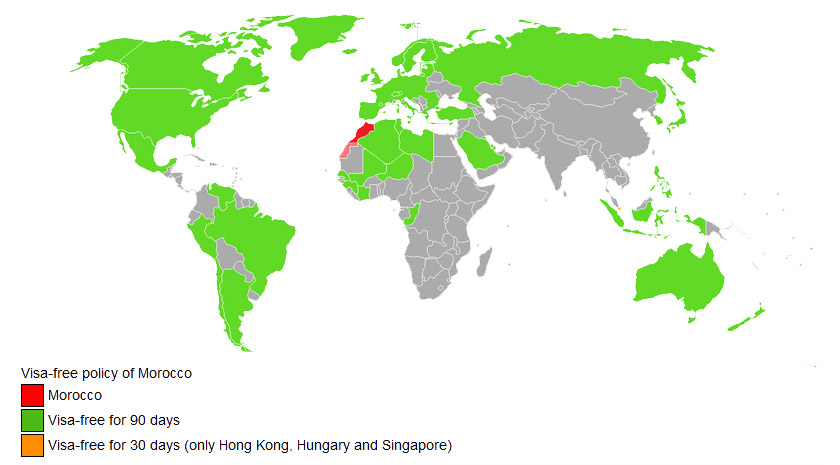
Addresses of the diplomatic bodies of Morocco in Russia
Embassy of the Kingdom of Morocco
- 121069, Moscow, st. Bolshaya Nikitskaya, 51.
- Phone/fax: (495) 690-20-85; 691-17-62; 691-94-93; 691-16-42.
The Consular Section
- 119049, Moscow, st. Koroviy Val, 7, building 1, office 77.
- Phone/fax: (499) 230-11-88.

